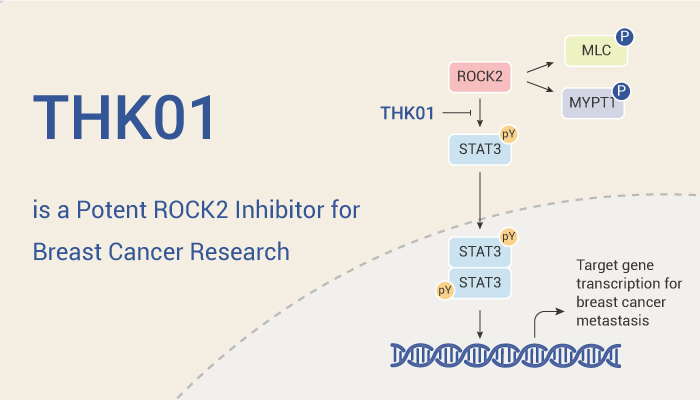Breast cancer is the most common malignancy in women, and one of the three most common cancers worldwide, along with lung and colon cancer. Metastases from breast carcinoma are formed in various organs, especially the lung, bone, liver, and brain. In fact, lung metastasis is the primary cause of death in metastatic breast cancer patients. However, how do we deal with this disease?
Rho-associated coiled-coil kinase (ROCK) belongs to a family of serine/threonine kinases that play fundamental roles in cellular processes, such as cell morphology, adhesion, and migration. Therefore, blocking ROCK signaling by directly inhibiting ROCK kinase activity is a viable strategy to suppress breast cancer metastasis. Hence, we will introduce a potent ROCK2 inhibitor-THK01.
THK01 is a ROCK2 inhibitor, with IC50 values of 5.7 and 923 nM for ROCK2 and ROCK1, respectively.
Moreover, THK01 can bind to and stabilize ROCK2 with potent anti-metastatic effects in breast cancer in vitro and in vivo with no obvious toxicities.
In vitro experiments, THK01 (1.25-10 μM; 48 h) suppresses the migration and invasion abilities of MDA-MB-231 cells in a dose-dependent manner. In addition, THK01 (1.25-10 μM; 24 h) down-regulates the phosphorylation level of STAT3Y705 in a dose-dependent manner, while slightly up-regulates the level of STAT3S727 in MDA-MB-231 cells. Moreover, THK01 (5 μM; 24 h) also suppresses breast cancer metastasis through the STAT signal pathway in MDA-MB-231 cells.
In vivo, THK01 (15 mg/kg; i.v.; single daily for 45 days) suppresses cell metastasis of breast cancer in female BALB/c nude mice.
All in all, ROCK inhibitors have a high potential for the suppression of cancer metastasis. THK01 is a high efficient ROCK2 inhibitor that can suppress cell metastasis and may provide us new options for breast cancer research.
Reference:
[1] Wang J, et al. Eur J Med Chem. 2023 Mar 15;250:115181.